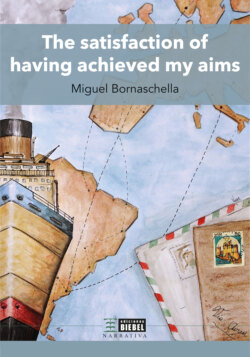Оглавление
Miguel Bornaschella. The satisfaction of having achieved my aims
Acknowledgements
The scribe’s words …
Foreword
I. Montaquilla, birth town
II. The origin of the migration
III. The world on the other side of the ocean
IV. Growing up on the other side of the ocean
V. The italian working culture and other italian traditions
VI. The first jobs
VII. The beginning of a long working life
VIII. The course of trade and the american model
IX. My own business
My first return to Italy
X. There are not two paradises
XI. My own family
XII. Clearing the mind and going on
XIII. Starting all over again
XIV. A new international trade
XV. The calm after the storm
XVI. Other areas
XVII. A trip in reverse - 50 years later
XVIII. My grandchildren
XIX. The last adventure?
Index
Отрывок из книги
Michael Bornaschella
THE SATISFACTION OF HAVING ACHIEVED MY AIMS
.....
The lives of all the members of my family and even the big house were saved from the devastation of the war. I must admit, that even living in a certain kind of poverty, our house stood up among the others in the town. My grand grandfather Giovanni Ricci came from a family that had been in better economic conditions than the others, thanks to some tricks of her mother… She had married a wealthy Ricci, father of my grand grandfather. By those days it was an ordinary thing to arrange marriages, no matter if there was love or not. People used the strangest reasoning to debate the convenience of their children’s marriage. Giovanni Ricci’s mother made use of some “appearance” in her dreams which recommended the union to that person who was, by chance, of an outstanding economic level. True or false, providential recommendation or practical reasoning, the case was that by the time being our families took advantage of that trick. Eventually those who formed that union were able to build a house that finally was outstanding in the town. The building of the house started in 1850 and was finished in 1855, as it was cut and remained forever in the stone of the arcade of the main entrance gate. That way the “palazzi isolati” –as these kinds of buildings were called– remained straight. It had a central yard called “cortillo” which was surrounded by several rooms and they were distributed, as it was usual by those days, to the different members of the family, which were at the same time occupied by their own ones. As it was logical and fair the properties passed from generation to generation, and as it was usual that none of the heirs could buy the corresponding part of others, it was then that the rooms were divided only among all those who had rights. The land was also divided this way, but if it was necessary, a surveyor was called. And if it still was necessary, justice definitely solved any disputes, thus it was the last word.
Every family had their own kitchen, which was also used to have lunch and dinner. It had a fireplace which worked with wood and was used both to cook and to heat the house, there was also an oven to cook bread and pizza. The whole family slept in one room. The tools used to work in the farm were in another room and there was a stable for the cow, the mule and the horse. There was only one of each one. The cow was used to give milk and the horse and the mule to draw the carriage and to cultivate the ground. There was also a place to keep the things produced in the farm (vegetables, fruit, meat) which were preserved in jars, bottles or vessels full of fat… People took and used only what was necessary to eat and sell - or exchange in case it were necessary. It was usual to see the fiddles where the olives were pressed with which oil was produced, or wine. There were no limits, it seemed, between one family and the others in the big house and everybody knew their secrets, their conversations, their joys and worries. Everybody could hear everybody’s conversations due to the proximity and also because they used to speak very loudly, and the roars resounded in the thick walls. But the comforts of the house were enough though. On one hand it was like this just because, and on the other hand because they did not know or have other possibilities. The electric energy was already supplied, but apart from the light at nights, there were no other gadgets to connect.
.....
